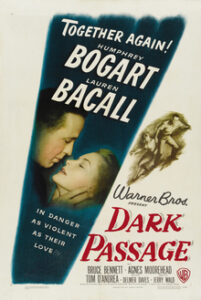Dark Passage-1947
Director Delmer Daves
Starring Humphrey Bogart, Lauren Bacall
Scott’s Review #1,393
Reviewed August 25, 2023
Grade: B
In 1947, Humphrey Bogart and Lauren Bacall were big Hollywood stars. Dark Passage is the third of four films a real-life couple made together in the 1940s. It must have catapulted audiences to theaters to see the power couple perform.
To Have and Have Not (1944), The Big Sleep (1946), and Key Largo (1948).
Dark Passage is based on the 1946 novel of the same title by David Goodis.
Vincent Parry (Bogart) has just escaped from San Quentin prison near San Francisco, California, after being locked up for murdering his wife, a crime he did not commit.
He finds a plastic surgeon to give him new features. After getting a ride out of town from a stranger, Vincent meets a young woman, Irene Jansen (Bacall). She lets him stay in her apartment while he heals and continues to try to clear his name.
The duo falls madly in love and attempts to figure out the puzzle and find the real killer.
Delmer Daves is a director with whom I am unfamiliar. The film’s first portion uses superior camera angles and a point-of-view (POV) filming from Vincent’s perspective.
The audience sees what Vincent sees, which was used to justify Vincent’s plastic surgery and the knowledge that viewers wouldn’t buy a different actor from Bogart. This makes sense and adds a creative technological perspective to the film.
Something about black-and-white filmmaking always conjures up 1940s cinema for me. That Dark Passage is a thriller with film noir elements, making it all the more effective.
A personal treat for me was to see the exterior sequences of San Francisco. The Golden Gate Bridge and Union Square are easy to spot, and having spent time in both locales, I was fascinated by what both looked and felt like in the 1940s.
Notwithstanding the ‘look,’ the main draw is Bogart and Bacall. Although I have not seen their other films, their chemistry is apparent in Vincent and Irene.
The tenderness between the pair, considering the characters have only just met, is strong, especially during a quiet scene when they sip after-dinner coffee next to a window with driving California rain.
They get to know each other, and so does the audience.
Bacall, who is terrific and smolders with sensuality and confidence, easily outshines Bogart, who doesn’t deliver his best work. This could be partly because he doesn’t speak until the midway point of the film, but there is an aura that Bacall has that Bogart doesn’t.
My favorite film of his is Casablanca (1942).
The story starts tremendously with mystery and intrigue. Who killed Vincent’s wife quickly becomes who killed Vincent’s friend after he is also found murdered.
A tremendous scene between Vincent, a man he hitches a ride from and a taxi cab driver who helps Vincent increases the thrill ride with quick and engaging dialogue meant to maintain suspense.
The climax fizzles with an overly complicated and overwrought build-up to the final reveal that drags. When the villains are unmasked, their motivations are suspect and underwhelming.
One character plummeting from a high-rise window to their death is pretty cool, especially for 1947. The shrieking neighbor and the dead body displayed along the sidewalk is a highlight.
Also, a portion of the film takes place in beautiful Peru, similar to the nightclub in Casablanca.
Dark Passage (1947) is a pretty good film but will be appreciated mainly by fans of Bogart and Bacall. The plot is up and down, but the behemoth Hollywood stars are the main attraction.
